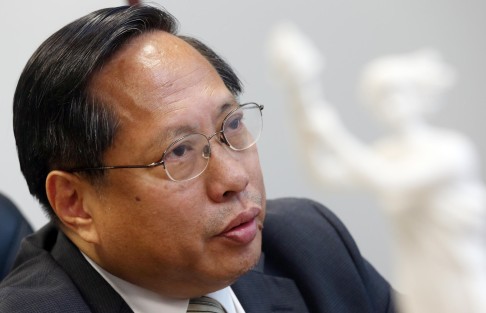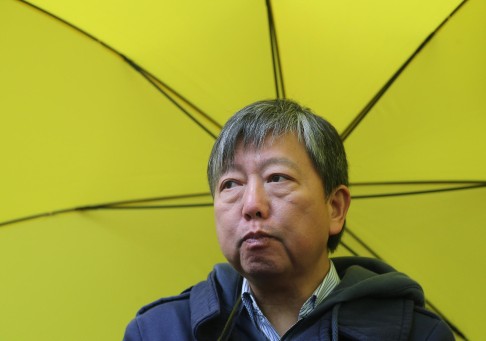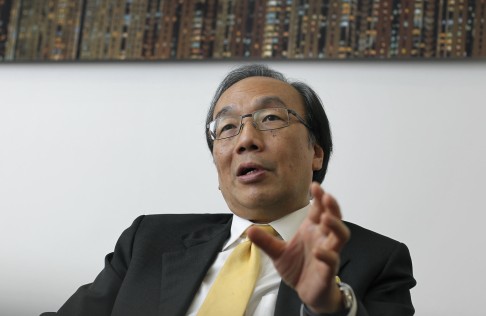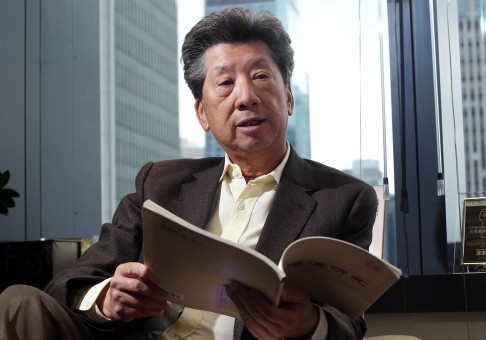Hong Kong's opposition pan-democrats plot their next move after defeating reform package
After defeating the electoral reform package, the pan-democrats are moving to plan their strategy for the next legislative and chief executive polls

When a botched ballot magnified an expected defeat of the government's electoral reform package with just eight votes in favour on Thursday, pan-democratic lawmakers gathered in a victorious mood to pose for a group photograph, enjoying their moment in history - but only very briefly.
Soon after they emerged from the Legislative Council chamber, the pan-democrats sounded a prudent note, vowing to continue fighting for true universal suffrage.
Granted, their wish to relaunch the reform exercise for the chief executive election may not come true any time soon, as Chief Executive Leung Chun-ying has said his administration will put aside the process for the remaining two years of his term.
But as they see it, their next battles will be at the November district council and 2016 Legco elections, to resist losing seats, as Leung and Beijing officials want electors to punish the pan-democratic camp for rejecting the reform plan. They want to retain their "critical minority" in the legislature so there are enough votes to thwart any more attempts at what they call fake universal suffrage.

Ho, a former chairman of the Democratic Party and a "super-seat" lawmaker, has decided to step down from the Legislative Council next year to give younger members of the party a chance to run. He will seek another term as a Tuen Mun district councillor. Ho says the botched walkout by the pro-Beijing legislators on Thursday will help improve morale in the pan-democratic camp.
"Now they [Beijing loyalists] can't go ahead with their 'vote us out' campaign as planned. The drama tells us that history always takes unexpected turns and we shouldn't be pessimistic," he said. "There's always a need to communicate with Beijing. But it takes two to tango. Our camp needs time to collect our thoughts and think about the way forward."
Amused as he claimed to be by the walkout drama, Ho said, "the pro-Beijing camp is a formidable state apparatus" that would soon recover.
Labour Party legislator Lee Cheuk-yan agreed. "The blunder shows the Beijing camp lacks independent thinking and only knows to follow the herd. But the die-hard supporters will stay loyal - [the elections will be] more about the swing voters."
Lee said his camp was setting up a "war room" for the district council polls, with the first meeting to be held this week.
The Labour Party chairman says the next battle for pan-democrats is the election of 18 district councils in November. The district councils handle neighbourhood issues but also influence the legislature and the city's politics.
"The pan-democratic camp is starting a 'war room' to think about strategies for the election and we will meet for the first time this week. The district council polls used to be very localised battles about residents' welfare and community infrastructure. But we must remind the people that the council actually has a heavy political role: councillors have votes in the nominating committee for the chief executive, and they also votes for two Legco seats. My party is also studying the misuse of funds by some councils and we'll tell the results to voters."
The "battle unit" will consist of two leaders from each pan-democratic party, who will think of ways to raise awareness of the political role of the 18 councils, which are mostly dominated by Beijing loyalists and focus on district-level issues such as recreational and community facilities.
"We must remind people that the councils actually have a heavy political role," Lee said, referring to the votes councillors can cast in past and future chief executive elections. They also elect their own representatives to fill two Legco seats and pick candidates for three other seats.
Next month, the pan-democrats will attend an evaluation camp to reflect on the way forward, Civic Party leader Alan Leong Kah-kit said.
"After 79 days of Occupy, we really have to articulate to our supporters and to the whole of Hong Kong how we are to rejuvenate ourselves, how we are to field more youthful candidates in the elections, especially the [Legco] poll in 2016, and how we are to collaborate with young and upcoming political forces," he said.
The Civic Party leader says pan-democrats will meet this week to set the agenda for an "evaluation camp" to be held towards the end of next month.
"The camp will be looking at the macro situation. We really have to articulate to our supporters and to the whole of Hong Kong how we will rejuvenate ourselves, and how we will field more youthful candidates for the elections, especially the Legislative Council in 2016. Look at the 12 young professional groups; they have already made their impact felt in [pressuring lawmakers] in the functional constituencies," Leong said, referring to recently-formed groups including lawyers, accountants and doctors who organised weekly street campaigns against the reform blueprint and lobbied members of their trades for support. "It is important for pan-democrats to come to have a view on how we want to engage with these young, up-and-coming political forces."
Leong was referring to 12 new professional groups that had organised weekly street campaigns against the reform blueprint. These groups, including lawyers, accountants, doctors and artists, had also lobbied members of their own trades for support.
The groups had "made their impact felt", Leong said, noting how the medical-sector lawmaker had broken ranks with his pro-establishment allies to vote against the reform package on Thursday, while the legislator for the architectural, surveying and planning sector had softened his hardline stance to opponents.
One way to engage the groups, Leong's party colleague Dennis Kwok suggested, was to encourage more professionals to contest the one-quarter of the 1,200 seats that would go to them on an election committee that would pick the chief executive in 2017.
But not all the 12 groups want to get up close and personal with politicians. James Fung Tak-kwan, spokesman of Médecin Inspirés, said their doctors would remain active in the democratic cause but would prefer to stay "professional and independent".
While wooing young professionals was a way of breathing new life into their cause, Lee, Ho and Leong all agreed new blood was wanting in their own parties. They also recognised a need to adopt a local perspective in their manifestoes and election platforms.
A localist approach did not amount to advocating independence or violence, despite Beijing officials' depiction of it, said Leong, who asked colleagues to revise his party's manifesto.
The three party leaders acknowledge regular, sincere communication with Beijing is necessary in order to bring the reform issue back to the table, but they are struggling to figure out how.
"Our camp needs time to collect our thoughts and think about how to make it happen," Ho said.
Ronny Tong Ka-wah, the Civic Party's lone dissenter known for his middle-of-the-road stance, said his answer was a post-mortem of the reform failure before anything else.
The Civic Party's lone dissident who has just set up his own think-tank, Path to Democracy, says a post-mortem examination of the failure of the reform process must be to be a priority. His think tank plans to release a report within six months, examining what caused the reform package to collapse and offering recommendations for the future.
"It is important for pan-democrats to review their standpoint and whether and how it contributed to the failure. Otherwise, it is meaningless to talk about restarting the reform exercise in the near future. I am hoping to meet all parties, including the pro-establishment camp, and also the government to discuss the reasons for failure. My think-tank will also conduct a survey on this. A report with recommendations will hopefully be delivered in half a year's time."
Tong said a think tank he had recently set up with scholars and others outside his party aimed to produce a report with recommendations in half a year's time.
"It is more important for pan-democrats to review their standpoint and whether and how it contributed to the failure. Otherwise, it is meaningless to talk about restarting the reform exercise."
Tong said he would seek to meet government officials and all political parties, including the pro-establishment camp, to discuss why the package collapsed.
Ultimately, the party leaders hope to push for a restart of the reform exercise in the months to come, although, as Lee admits, the chances are low in the remainder of Leung's term, and people are tired or even disillusioned after Occupy.
"The 2017 chief executive poll will be the next opportunity for the reform debate to grip the whole city again, when the candidates are expected to talk about that," Lee said. "Before that, we must soldier on."
Additional reporting by Jeffie Lam


